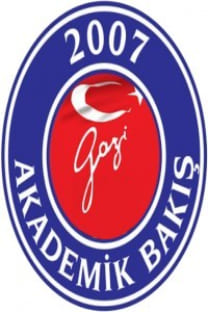Türk Dış Politikasının Yükselen Değeri: Kültürel Diplomasi
Kültürel diplomasi, Türk dış politikası, STK, yumuşak güç, paralel diplomasi
Rising Value of Turkish Foreign Policy: Cultural Diplomacy
Cultural diplomacy, Turkish foreign policy, NGO, soft power, parallel diplomacy,
___
- AKÇADAĞ, Emine. “Dünya’da ve Türkiye’de Kamu Diplomasisi”, http://www.ka- mudiplomasisi.org/pdf/emineakcadag.pdf AKGÜN, Mensur ve Senyücel Gündoğar, Sabiha Ortadoğu’da Türkiye Algısı 2011,
- TESEV Dış Politika Programı, http://www.tesev.org.tr/Upload/Publication/ a60ce1cc-c872-4b04-9901-80109e6c1d9b/OD_Turkiye_Algisi_2011.pdf
- AKYILMAZ, Gül, Osmanlı Diplomasisi ve Teşkilatı, Konya 2000.
- ARAS, Bülent, “Turkey’s Rise in the Greater Middle East: Peace-Building in the Pe- riphery”, Journal of Balkan and Near Eastern Studies, Volume 11, Number 1, March 2009.
- BOZKUŞ, Seyda Barlas. “Kültür Diplomasisinin Sınırları: Türk Kültür ve Sanatı- nın Uluslararası Platformlarda Tanıtımı (1980-2010)”, 20 11, http://globalmedi- ajournaltr.yeditepe.edu.tr/makaleler/GMJ_3._sayi_Guz_2011/PDF/Bozkus.pdf
- BRZEZINSKI, Zbigniew, The Choice: Global Domination or Global Leadership? New York, Basic Books. 2004.
- CUMMINGS, Milton C. Cultural Diplomacy and the United States Government: a Sur- vey, Center for Arts and Culture, 2003.
- ERHAN, Çağrı, Türk Dış Politikasının Güncel Sorunları, İmaj Yayınevi, Ankara, 2010.
- FULLER, Graham E, Yükselen Bölgesel Aktör Yeni Türkiye Cumhuriyeti, Çev. Mustafa Acar, Timaş, İstanbul, 2008.
- GOULD, Nigel, “The Logic of Soviet Cultural Diplomacy”, Diplomatic History, V.27, N.2, 193-214, 2003.
- KALIN, İbrahim, “Soft Power and Public Diplomacy in Turkey”, Perceptions, Au- tumn 2011, V. XVI, N.3. 2011, http://sam.gov.tr/wp-content/uploads/2012/01/ ibrahim_kalin.pdf
- KITSOU, Sofia,“The Power of Culture in Diplomacy: The Case of U.S. Cultural Diplo- macy in France and Germany”, Exchange: The Journal of Public Diplomacy, V.2, 21-39, 2011.
- KİREÇÇİ, M. Akif, “Relating Turkey to the Middle East and North Africa: Arab Spring and the Turkish Experience”, Bilig, N.63,2012, pp. 111-134.
- Macmillan, Margaret, Paris 1919: Dünyayı Değiştiren Altı Ay, ODTÜ Geliştirme
- Vakfı Yayıncılık, Ankara, 2004.
- NYE, Joseph S., The Soft Power of the United Nations, 2007 http://www.project- syndicate.org/commentary/the-soft-power-of-the-united-nations
- NYE, Joseph S., The New Public Diplomacy, 2010 http://www.project-syndicate.org/ commentary/the-new-public-diplomacy
- OĞUZLU, Tarık,“Middle Easternization of Turkey’s Foreign Policy: Does Turkey Dissociate from the West,” Turkish Studies, Vol.9, No.1. 2008.
- Report of the Advisory Committee on Cultural Diplomacy. Cultural Diplomacy The Linchpin of Public Diplomacy, US Department of State., 2005.
- SCHNEIDER, Cynthia P. “The Unrealized Potential of Cultural Diplomacy: “Best Practices” and What Could Be, If Only…”, The Journal of Arts Management, Law, and Society, Vol. 39, No.4. 2009.
- TANGÖR, Burak,. Avrupa Güvenlik Yönetişimi Bosna, Kosova ve Makedonya Krizleri, Seçkin, Ankara, 2008.
- Türkiye Kalınma Yardımları Raporu 2011, TİKA, http://store.tika.gov.tr/yayin- lar/kalkinmayardimi/KalkinmaYardimlariRaporu2011.pdf
- ISSN: 1307-9778
- Yayın Aralığı: 2
- Başlangıç: 2007
- Yayıncı: Hale Şıvgın
Avrupa Bütünleşmesi İçin Önemli Bir Adım: ‘‘Avrupa Konseyi’’ ve Türkiye’nin Konseye Üyeliği Meselesi
Ali Servet ÖNCÜ, Erkan CEVİZLİLER
Ramazanoğulları Beyliği'nin kuruluşu
Cumhuriyet Dönemine Geçiş Sürecinde Diyarbakır'da İktisadi-Mali ve Sosyal Yapı
Avrupa bütüleşmesi için önemli bir adım: Avrupa konseyi ve Türkiye'nin konsye üyeliği meselesi
Erkan CEVİZLİLER, Ali Servet ÖNCÜ
Türk-Arap İlişkilerine Etkisi Bakımından Bağdat Paktı
Türkiye ile Almanya Arasındaki Bilimsel İlişkiler: Türk-Alman Üniversiteleri
Temettüât Kayıtlarına Göre Manisa Koldere Çiftliği/Köyü'nün Sosyo-Ekonomik Durumu (1844-1845)
